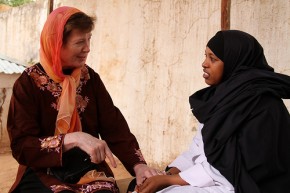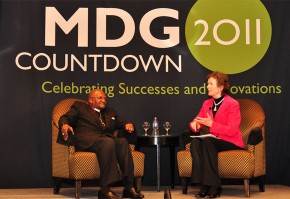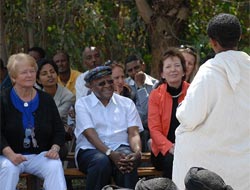As we approach International Women's Day, it is appropriate to reflect on how well we are doing in assuring the human rights of women worldwide.
In these complicated economic and political times, it is clear that women are bearing a disproportionate burden of poverty, ill heath, gender based violence, and hunger. Yet despite these facts, I feel a sense of hopefulness at the resilience of women and I see anew the importance of the "common standard of achievement" for all peoples set out in the Universal Declaration of Human Rights.
The Declaration recognizes civil and political rights - but also the importance of economic, social and cultural rights including the right to decent work, to adequate health care and education. Yet the path to gender equality and women's empowerment remains an uphill battle for many women, often complicated by a lack of access to family planning and sexual and reproductive health services.

On a recent visit to Somalia I witnessed first-hand again yet another famine of desperate proportions where over 40,000 children have already died. Each Somali woman I spoke with, most of whom had walked for days to reach the camps, told me she had six or more children, and that she could not care for them all.
Somalia has the eighth highest birthrate in the world, yet only 1% of Somali women have access to modern contraception. In Somalia, food security, population, and women's rights and health are profoundly linked.
Women know that family planning is a cost effective means to alleviate poverty, and to save lives. Healthy women have healthy families, and the ability to choose if, when and how many children to have is a fundamental human right currently denied to 215 million women worldwide. That is why I am joining my fellow members of the Global Leaders Council for Reproductive Health, the Gates Foundation, and DFID in London on International Women's Day March 8th. Members of the Global Leaders Council - former heads of state and other policymakers - will gather at the House of Commons at the invitation of the UK All Parliamentary Group on Global Health to discuss the importance of investments in family planning to development and prosperity.
I also welcome the fact that the UK Department for International Development plans to host a Family Planning Summit in London in July 2012 to highlight ways of meeting the family planning needs of women in the world's poorest countries by 2020.

During my work as former UN High Commissioner for Human Rights, as former President of Ireland, as an Elder, and now as President of the Mary Robinson Foundation - Climate Justice, I have seen the results of terrible acts of violence, poverty, hunger, silence and suffering - but I have also seen amazing acts of resilience.
It is this resilience that offers hope for our planet and it is poor women who display this most poignantly. I can only conclude that resilience is the new watchword for women.
Last month, the United Nations released their much awaited, highly negotiated report on global sustainability, 'Resilient People, Resilient Planet: A Future Worth Choosing'. The report comes 20 years after the Brundtland Report, 'Our Common Future', set the stage for the Earth Summit in Rio. It is instructive to review that report and think what has changed in the past two decades. 'Our Common Future' understood that the world's population would grow, but more importantly understood that to survive as a species we as humans would need to work together, and that changes in consumption patterns would be needed. The Brundtland Report put humans at the centre of development. It asked the world to envision a more just future for all, regardless of geography, gender, race or nationality.
In the past two decades, although some progress has been made, many experts would argue that as a planet we now face an environmental tipping point.

We must make investments in resilience a priority. Women know that access to family planning services and the availability of supplies are important first steps in helping women to become resilient. Women are responsible for around 75% of household food production in sub-Saharan Africa, 65% in Asia and 45% in Latin America. They are caregivers, educators, farmers, and entrepreneurs. Investments in their health pay social and economic dividends.
I have a sense of urgency about the upcoming Rio+20 meeting planned for June in Brazil. It offers us the opportunity for a new and more nuanced conversation about sustainability and resilience. It also challenges us to create a global system based on equity , which will provide basic care to its citizens, and where all people are seen as part of a globally sustainable economic, environmental and social system. Human dignity is at the centre of the 'Resilient People, Resilient Planet: A Future Worth Choosing' report, not geo-politics - and gender equality and women's empowerment are critical building blocks in the future of all nations.
To advance the conversation about resilience, we have no choice but to talk about the uneven distribution of resources, the growing disparities between and within countries, and the importance of gender equality. Agronomists, economists, public health professionals and politicians all agree there is enough food to feed everyone, but many go to bed hungry (60% of the chronically hungry are women and girls).
There are enough resources available in the world to provide basic health care for all, but many die from preventable, treatable illnesses. Women die in childbirth when simple proven and inexpensive interventions exist. There needs to be a radical re-dedication to assuring the fundamental human rights of all people living on the planet.
On International Women's Day, I invite all leaders to join me in affirming the rights of women everywhere and ask them to work together to build policies and programmes that address the equality of all people.
Please note, this is a guest blog. Views expressed here do not necessarily represent the views of DFID or have the support of the British Government.
UK aid is changing lives: find out how on our Facebook page.
Learn more: reproductive, maternal and newborn health is a key issue for DFID.
Listen: Nobel Peace Prize winner Leymah Gbowee speaks about the importance of women in peace-building in the latest DFID podcast.


1 comment
Comment by Patricia O'Gorman, PhD posted on
Dear Mary,
On the eve of International Women's Day 2013 my newest book on women and resilience: The Resilient Woman: Mastering the 7 Steps to Personal Power will be published--3.5.13. My thesis is that yes indeed women are resilient, we have to be. We deal with adversity daily. But what we don't do, and where the next edge for women is, is to begin to use our resilience 'consciously' to empower ourselves, not use our resilience solely to take care of our children, our family, our work. We need to also take care of our own health and mental health needs and we can do this we we 'consciously' employ using these considerable skills to determine what it is that we need.